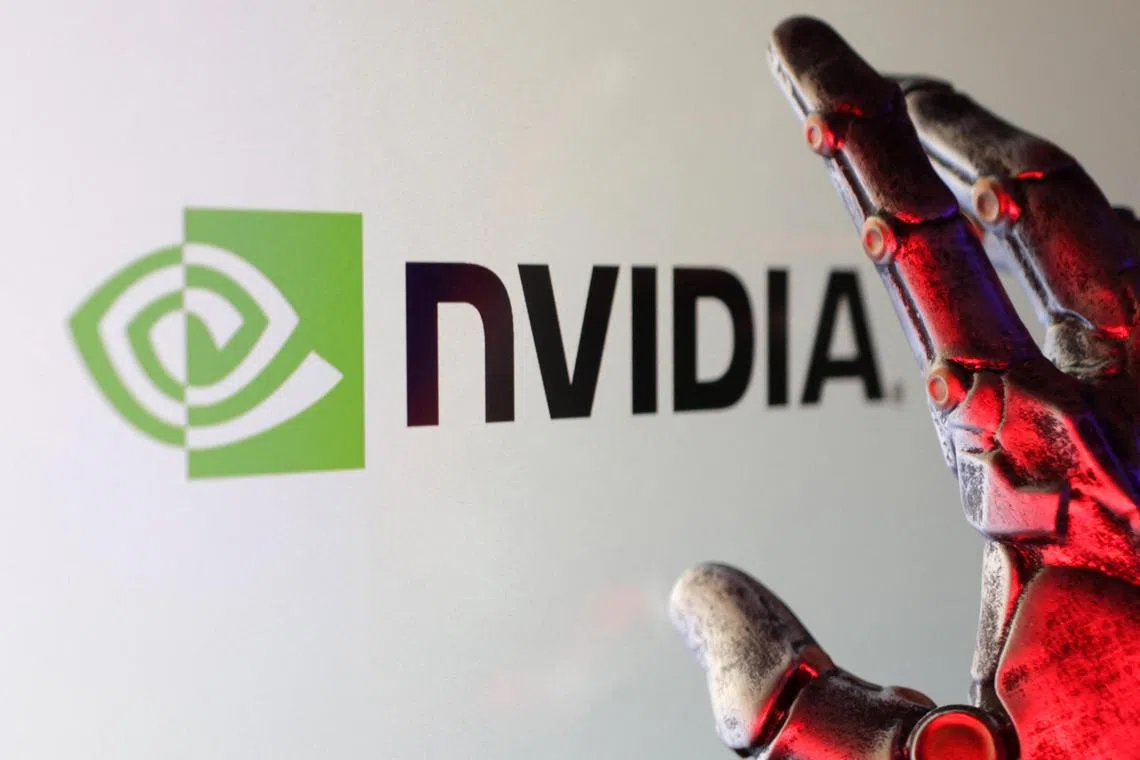Nvidia sales grow 78%, showing AI boom not dead even as breakneck pace of growth slows
Sign up now: Get ST's newsletters delivered to your inbox

Nvidia controls 90 per cent of the market for the graphics processing units that power AI systems.
PHOTO: REUTERS
Tripp Mickle
Follow topic:
SAN FRANCISCO – When Nvidia lost US$600 billion (S$802.9 billion) in market value in a single day in January, it was because some investors feared for the future of the artificial intelligence (AI) chipmaker. DeepSeek, a Chinese start-up, said it had made its AI systems with a small fraction of the AI chips used by other companies, and at a small fraction of the cost.
On Feb 26, Nvidia showed those fears were overblown, even as the breakneck pace of its growth slows.
The company, a bellwether for AI, said purchases of its AI chips lifted its total revenue in the fourth quarter by 78 per cent from a year earlier to US$39.33 billion during the three months that ended in January. Profit rose 80 per cent to US$22.09 billion.
In previous quarters, Nvidia reported that sales and profits had more than doubled. But continuing to deliver those kinds of gains has become more difficult as its sales and profits rise. (For a business like Nvidia, it is common for the growth rate to slow after a period of extraordinary increases, a phenomenon known as the law of large numbers.)
Nvidia’s quarterly results exceeded Wall Street analysts’ expectations for US$38.32 billion in sales and US$21.08 billion in profit.
The company projected that revenue in the current quarter would rise 65 per cent from a year ago to US$43 billion, a slowdown from the previous quarter but about US$1 billion more than Wall Street had predicted.
Shares in Nvidia were almost flat in after-hours trading, following the company’s 3.7 per cent gain on Feb 26. It remains the world’s second-most-valuable publicly traded company, behind Apple.
Nvidia’s business has been buoyed by the biggest tech companies’ non-stop spending on AI data centres. After pouring tens of billions of dollars into new infrastructure in 2024, Amazon, Microsoft, Alphabet and Meta have said they will each spend US$65 billion to US$100 billion or more in 2025.
Much of that money will flow straight to Nvidia.
The company, by some estimates, controls 90 per cent of the market for the graphics processing units, or GPUs, that power AI systems. It is rolling out a new, more powerful series of AI chips known as Blackwell and charges US$60,000 to US$70,000 for a signature chip.
How long the building of data centres will last has been a question since the start of the AI boom.
DeepSeek challenged a tech industry consensus that to build bigger and better AI systems, firms would have to build bigger and more powerful data centres. It set off fears that firms might pull back on their spending with Nvidia.
Since then, a new consensus has emerged that Nvidia will continue to benefit because it will become affordable for more companies to develop AI systems.
An expanded field of AI businesses would create more customers for Nvidia’s expensive chips, not fewer, as initially feared.
Nvidia said data centre revenue, which includes the sale of chips, cables and high-performance computing, rose 93 per cent to US$35.58 billion in the quarter from a year earlier.
“Nobody is backing off their commitment to build AI data centres and the power to generate more electricity for those data centres,” said Mr Brian Mulberry, client portfolio manager at Zacks Investment Management, a financial firm that tracks Nvidia. “Everyone is still competing.”
Though Nvidia has rebounded since late January, concerns about data centre spending continue to whiplash the stock. Shares fell nearly 6 per cent early this week after Wall Street analysts reported that Microsoft had cancelled some data centre contracts. Microsoft did not respond to requests for comment.
In a statement, Nvidia’s chief executive Jensen Huang said: “We’ve successfully ramped up the massive-scale production of Blackwell AI supercomputers, achieving billions of dollars in sales in its first quarter. AI is advancing at light speed.”
Nvidia also continues to face geopolitical challenges. The Biden administration curbed the sale of its chips to China and introduced a rule to cap the sales of its AI chips to more than 100 countries.
US Commerce Secretary Howard Lutnick told Congress during his confirmation hearing that tech companies, including Nvidia, “need to stop helping” China.
Since the US government began restricting chip exports, Nvidia’s sales in China have fallen to less than 14 per cent of revenue from 19 per cent in the fiscal year 2023.
In January, Mr Huang visited the White House to discuss AI and semiconductors with President Donald Trump.
Mr Trump told reporters after the visit that he could not say whether he would ban more of Nvidia’s chip sales to China.
NYTIMES

